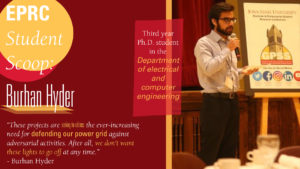
EPRC Student Scoop: Burhan Hyder prevents power grid crashes
In the ever-changing technological landscape society lives in today, it is hard to keep track of and understand all the new data. As technology changes, potential hackers have different opportunities to crash systems.
Burhan Hyder, a third year Ph.D. student in the Department of Electrical and Computer Engineering at Iowa State University, is using his research to address this problem — working to secure the nation’s power grid so the lights never go out.
Hyder’s path for power systems started in India, where he grew up. After receiving his bachelor’s degree there, he worked in the power engineering industry for about a year and a half, until he realized his passions lie in research. Because of that realization, Hyder pursued higher education — and found Iowa State to be the perfect fit.
“Iowa State University was a very good option for me to consider due to various reasons. The power and energy systems department at Iowa State is one of the best in the United States.” Hyder said. “Iowa State University is part of the Power Systems Engineering Research Center (PSERC) which comprises top power research groups from 12 universities from all over the U.S. along with 30 industries. Additionally, one of my very good friends was already enrolled in the same program here, which helped me to confidently choose ISU.”
After he was enrolled at Iowa State, Hyder discovered the Electric Power Research Center (EPRC) at Iowa State. Here, Hyder could more thoroughly study and conduct research in the power systems engineering field.
“I came to know about EPRC after I joined Iowa State through my peers and faculty. I then realized that it is a great platform for collaboration and identifying practical research problems through a joint community,” Hyder said. “Perhaps, EPRC is one of the factors that make the power and energy systems department one of the best in the U.S.”
Hyder is currently working on two projects in his studies. One project is with game theory, a branch of mathematics analyzing complex situations, addressing cyber security issues within the power grid. His other project revolves around the development of a testbed for testing and evaluating smart grid security tools and technologies.
“The game theory-based project is a novel approach of looking at grid cyber security from a different perspective,” Hyder said. “The testbed project is helping us in bridging the gap between academic research and industry deployment.”
EPRC in itself is commonly known for its mix of industry and academic research, making it the perfect fit for Hyder.
“One of my projects is helping us in bridging the gap between academics and the industry by providing a platform where algorithms and tools are tested and evaluated to check their industry readiness. The game theory project aims at solving the critical issue of cyber security, prediction and modeling of attacker behavior in the current dynamically changing cyber landscape,” Hyder said. “Overall, these projects are seeking to address the ever-increasing need for defending our power grid against adversarial activities. After all, we don’t want these lights to go off at any time.”
Hyder is working with ECpE’s Anson Marston Distinguished Professor Manimaran Govindarasu. Govindarasu is always encouraging and pushing his students to collaborate with industries and each other, Hyder said.
“Professor Manimaran Govindarasu is a cheerful human being with tremendous knowledge in his field of work,” Hyder said. “I have immense respect for his philosophy of research, wherein he wants his students to work on practical problems that have a tangible impact on society. It is a great experience to work with him. He keeps his research group integrated in the sense that we are regularly collaborating, apart from conducting our research.”
In Hyder’s research, he is helping secure the power grid — which then provides a safer community for everyone and for their homes.